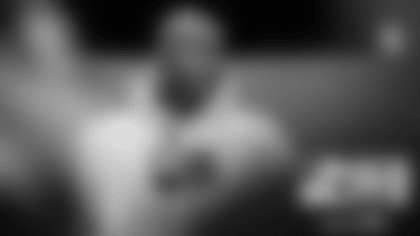- A December visit from the Saints has been a rarity of late, but the history of such meetings is good for the home team
- New Orleans has won the last six games in the series to take a 28-17 all-time lead
- Among the most memorable Buccaneer wins over New Orleans was the 1977 decision that stands as the franchise's first victory
The New Orleans Saints will play their last football of the 2014 season at Raymond James Stadium. That's a rarity – not only have the Saints not played in Tampa in Week 17 in almost a decade, but they haven't even made their annual Florida trip in the month of December since 2005. The reverse trip has been much more common over the past decade; the Bucs played in New Orleans in December or January in 2007, 2009, 2010, 2012 and 2013, with the 2010 and 2013 meetings being season-cappers.
There was a lot more at stake for the Buccaneers the last time the Saints visited in Week 17, as the home team had a 10-5 record and was trying to nail down the NFC South title. The Bucs won; more on that below. The Saints also came to Tampa two days before Christmas in 2001, and that game also went well for the home team.
The 2014 Buccaneers won't have a chance to use the Saints as a springboard to the playoffs – nor can the Saints use Week 17 to that end either after being eliminated from contention last Sunday – but they could put an end to New Orleans' six-game winning streak in the head-to-head series. That run has taken what had been a relatively close all-time matchup and made it 28-17 in the Saint's favor. New Orleans has won 12 of their 19 games played on the Buccaneers' turf.
Even without the edge in the all-time series, the Bucs have had some important moments with the Saints on the field. That began in 1977, when Tampa Bay carried an NFL-record 26-game losing streak into New Orleans late the year. That was just the Bucs' second year of existence, and expansion rules were not nearly as favorable in that era as they would be in later waves that brought in Carolina, Jacksonville, the new Cleveland Browns and Houston. Head Coach John McKay started with a roster mostly made of castoffs and rookies in 1976, but had at least fashioned a presentable defense by 1977. That defense went nuts in the Superdome, returning three interceptions for touchdowns, a feat that the Buccaneers have only matched once in the next 37 years, and that was in their Super Bowl XXXVII victory over Oakland. Tampa Bay's win cost Saints Head Coach Hank Stram his job but caused jubilation in Tampa, where thousands were waiting at team headquarters for the Buccaneers' return that evening.
The Saints – now with Dick Nolan at the helm – got a bit of revenge the next two years in Tampa, winning 17-10 in 1978 and 42-14 in 1979. That latter loss was a bit of a surprise, as the Buccaneers had started the '79 season with five straight wins and then lost by just three points to the Giants on the road in Week Six before the Saints' visit. The 2-4 Saints came to town, and after a strange, scoreless first half, the Buccaneers scored three plays into the second half on a 49-yard Ricky Bell run followed by a 22-yard Isaac Hagins TD catch. Looking good, right? Well, sure, until the Saints scored a touchdown on each of their next six possessions, almost all of it coming on the ground. New Orleans ended up running for 234 yards and five scores in a 42-14 blowout. The Bucs would still rally to win the division that year.
The Bucs were also playoff bound in 1981 and 1982 when they went back to New Orleans, and they won both, 31-14 and 13-10. That former game was closer than the score indicates, as the Bucs held a 17-14 lead midway through the fourth quarter before Doug Williams hit Gordon Jones on a four-yard touchdown pass and James Owens ran one in from six yards out. In the latter game, with both the Bucs and the Saints battling a crowded NFC playoff field in the 1982 season truncated by a players' strike, Tampa Bay won by about a foot. That's the estimated distance that the great Morten Andersen missed a 60-yard field goal try at the end of a 13-10 Bucs decision in New Orleans, one in which former Raiders QB Kenny Stabler threw 43 times for 333 yards and a score. The Bucs countered with S Neal Colzie, who recovered two fumbles, had a sack of Stabler and racked up 10 tackles.
Neither the Bucs nor the Saints had much going for them through the middle of the '80s, and that contributed to the frequency with which they were reacquainted, as the NFL's old scheduling formula relied much more on strength of schedule (i.e. the previous year's records). So it was that the Bucs and Saints met every year from 1977-92 except 1980. The Saints had a run of playoff contention from 1987-92 and the Bucs followed with one of their own from 1997-2002…and somehow the annual meetings continued. After the aforementioned streak, the Bucs and Saints also played each other in 1994, 1996, 1998, 1999 and 2001. All told, Tampa Bay played New Orleans 20 times from 1977 through 2001, making the Saints its most frequent opponent outside of the now-defunct NFC Central division. Obviously, the formation of the NFC South in 2002 meant those nearly annual meetings would become annual double-dips.
There were some memorable moments before the two teams became division foes. New Orleans won 13 of those first 20 games and did have a six-game run of victories from 1983-88; a 1989 Tampa Bay victory interrupted that streak but the Saints countered with the next four decisions.
The 1987 meeting between the two teams may not have had much in the way of playoff implications, but it did mark the first NFL start for QB Vinny Testaverde, the first overall pick in the '87 draft. The Saints were clearly going to the postseason and the Bucs were clearly not when the two teams met in December of that year, but it was still an important outing for the visiting team as it turned over the reins to its prized rookie. Testaverde promptly threw for 369 yards – 212 of them to fellow rookie WR Mark Carrier – but the Bucs lost 44-34, in part because Testaverde lost fumbles on each of his team's first two drives.
Ten years after his missed 60-yarder, Morten Andersen hit from 50 yards out to give New Orleans a 23-21 win in New Orleans in 1992. The Bucs had taken the lead earlier in the fourth quarter on Reggie Cobb's four-yard TD run, and had been in the game despite a struggling offense (309 Saints yards to the Bucs' 154) thanks to LB Broderick Thomas' 56-yard pick-six. In 1996, a 13-7 win over the Saints in Tampa was part of the encouraging 5-2 finish to the season that preceded a long run of playoff campaigns. Rookie FB Mike Alstott had one of his best games, catching seven passes for 91 yards and a touchdown, and the Bucs picked off Saints QB Jim Everett three times.
The Bucs took the last two meetings between the teams before they both joined the NFC South, winning handily in both 1999 (31-16) and 2001 (48-21). Those were also playoff seasons for the Buccaneers. However, when the South was formed in 2002, the Saints took what proved to be a surprising series sweep, given that Tampa Bay lost only four games that entire season and went on to win the Super Bowl. New Orleans captured the season opener that September, 26-20 in overtime, in what was not only the Bucs' first game in their new division but also the first game under new Head Coach Jon Gruden.
The Buccaneers and Saints were totally even after the first 10 years of NFC South play, each winning 10 times. The Bucs got sweeps in 2005 and 2007, and to continue the theme, in both cases made it to the postseason. However, the Saints' sweep last year extended their current streak in the series to five games (and it went to six earlier this year).
The Bucs and Saints were both 7-6 when they met two days before Christmas in 2001 (the season was pushed back by the 9/11 terrorist attacks), but this one didn't seem like an even match of playoff hopefuls. The Buccaneers completely dominated the game, beginning with Aaron Stecker's 86-yard non-scoring kickoff return to open the action. Stecker's return set up a 14-yard touchdown catch by WR Karl Williams and began a Buc avalanche that led to a 30-0 lead and an eventual 48-21 victory. Ronde Barber tied a team record by picking off three passes, returning one of them for a touchdown.
Amazingly, Barber would have another three-interception game against the Saints just four years later, in 2005, in a game played at LSU's Tiger Stadium in Baton Rouge thanks to Hurricane Katrina. The Bucs would need all of those takeaways to hold on to a 10-3 win in which the offense generated just 215 total yards. The two teams met again in Tampa in the season finale, and the Buccaneers won again, 27-13, to take the NFC South crown. The game was still in doubt inside the two-minute warning in the fourth quarter, with the Saints near midfield and trailing 20-13. That's when DE Dewayne White sacked QB Todd Bouman, forced a fumble, recovered the loose ball and ran 34 yards for the clinching touchdown.
Perhaps the Bucs' most surprising win in the series – though Hank Stram's 1977 bosses might have argued the point – came five years ago near the end of the 2009 season. That happens to be the greatest season in Saints history, one that culminated in a 31-17 win over Indianapolis in Super Bowl XLIV. For the Buccaneers, it was their first year under the leadership of Head Coach Raheem Morris, and the team was definitely a work in progress. As such, Tampa Bay took a 2-12 record into the Superdome to face the 13-1 Saints. In what is one of the biggest upsets in NFL history, in terms of the two teams' disparate W-L records, the Buccaneers withstood a typical Drew Brees outing (32 of 37 for 258 yards, one TD and no INTs), countering with Cadillac Williams' 129 rushing yards and one huge play on special teams. That play was a 77-yard punt return for a touchdown by Micheal Spurlock that tied the game at 17-17 with 2:25 left in regulation. Brees drove the Saints down into field goal range at the end of regulation but Garrett Hartley missed a 37-yard field goal. Given a second chance, the Bucs won the toss to start overtime and simply handed the ball to Williams over and over again. He carried the ball on nine of the 10 plays of a 48-yard drive that set up Connor Barth's game-winning 47-yard field goal.
The Bucs also beat a playoff-bound Saints team in the Superdome on the final weekend of the following season, though on this occasion the visitors were also chasing a playoff berth. The Bus had to have a win (and some help) to keep their postseason hopes alive, and Josh Freeman completed 21 of 26 passes for 255 yards, two touchdowns and no picks in a 23-13 Bucs win. Tampa Bay didn't get the help it needed, however, losing a third-level tiebreaker for the final playoff spot to the Packers, who would go on to win the Super Bowl. As mentioned above, the Saints followed that with the next three wins in New Orleans, bringing us to the current day. The most lopsided of those was a 41-0 near the end of 2012 in which the Saints racked up 447 yards of offense and Brees threw for four touchdowns while Freeman was intercepted four times.
Bucs-Saints Game-by-Game Record:
|
1977 |
W, 33-14 |
New Orleans |
|
1978 |
L, 17-10 |
Tampa |
|
1979 |
L, 42-14 |
Tampa |
|
1981 |
W, 31-14 |
New Orleans |
|
1982 |
W, 13-10 |
New Orleans |
|
1983 |
L, 24-21 |
Tampa |
|
1984 |
L, 17-13 |
New Orleans |
|
1985 |
L, 20-13 |
New Orleans |
|
1986 |
L, 38-7 |
New Orleans |
|
1987 |
L, 44-34 |
New Orleans |
|
1988 |
L, 13-9 |
New Orleans |
|
1989 |
W, 20-10 |
Tampa |
|
1990 |
L, 35-7 |
New Orleans |
|
1991 |
L, 23-7 |
New Orleans |
|
1992 |
L, 23-21 |
New Orleans |
|
1994 |
L, 9-7 |
Tampa |
|
1996 |
W, 13-7 |
Tampa |
|
1998 |
L, 9-3 |
New Orleans |
|
1999 |
W, 31-16 |
New Orleans |
|
2001 |
W, 48-21 |
Tampa |
|
2002 |
L, 26-20 (OT) |
Tampa |
|
2002 |
L, 23-20 |
New Orleans |
|
2003 |
L, 17-14 |
Tampa |
|
2003 |
W, 14-7 |
New Orleans |
|
2004 |
W, 20-17 |
New Orleans |
|
2004 |
L, 21-17 |
Tampa |
|
2005 |
W, 10-3 |
Baton Rouge |
|
2005 |
W, 27-13 |
Tampa |
|
2006 |
L, 24-21 |
New Orleans |
|
2006 |
L, 31-14 |
Tampa |
|
2007 |
W, 31-14 |
Tampa |
|
2007 |
W, 27-23 |
New Orleans |
|
2008 |
L, 24-20 |
New Orleans |
|
2008 |
W, 23-20 |
Tampa |
|
2009 |
L, 38-7 |
Tampa |
|
2009 |
W, 20-17 (OT) |
New Orleans |
|
2010 |
L, 31-6 |
Tampa |
|
2010 |
W, 23-13 |
New Orleans |
|
2011 |
W, 26-20 |
Tampa |
|
2011 |
L, 27-16 |
New Orleans |
|
2012 |
L, 35-28 |
Tampa |
|
2012 |
L, 41-0 |
New Orleans |
|
2013 |
L, 16-14 |
Tampa |
|
2013 |
L, 42-17 |
New Orleans |
|
2014 |
L, 37-31 (OT) |
New Orleans |
Series Notes:
- Overall Season Series: Saints lead, 28-17
- Bucs' Home Record: 7-12
- Bucs' Road Record: 10-16
- Current Streak: Lose 6 (2011-14)
- Buccaneers' Longest Winning Streak: 2 (six times)
- Saints' Longest Winning Streak: 6 (1983-88, 2011-14)
- Regular Season Point Total: Buccaneers 821, Saints 986
- Most Points in a Game for Tampa Bay: Buccaneers, 48, Saints 21 (2001)
- Most Points in a Game for New Orleans: Saints 44, Buccaneers 34 (1987)
- Most Points, combined: Saints 44, Buccaneers 34 (1987)
- Fewest Points in a Game for Tampa Bay: Saints 41, Buccaneers 0 (2012)
- Fewest Points in a Game for New Orleans: Buccaneers 10, Saints 3 (2005)
- Fewest Points in a Game, combined: Buccaneers 10, Saints 3 (2005)






















